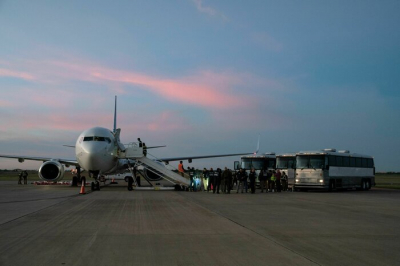
Bessemer's Battle: Amazon Workers' Unionization Quest Continues
In March 2022, workers at the Amazon warehouse in Bessemer, Alabama, embarked on a pivotal journey, holding a revote on unionizing. Yet, the outcome remained veiled in uncertainty. Could this have marked the dawn of the first unionized Amazon warehouse in the nation? Fast forward three years, and the suspense lingers as workers await a potential third opportunity to decide their fate through a union election.
A monumental, months-long hearing kicks off on Thursday, aimed at determining the destiny of the unionization endeavor within Amazon's Bessemer facility. An administrative law judge, presiding over the proceedings at the National Labor Relations Board (NLRB), will meticulously scrutinize the conduct of both the company and the union during the previous election—a contest that has remained deadlocked since 2022.
Amidst the backdrop of the COVID-19 pandemic's peak, labor activists rallied, gathering sufficient signatures from Bessemer's workforce to trigger the historic union election at an Amazon stronghold. Advocates for unionization championed causes ranging from extended breaks to enhanced health and safety protocols, augmented wages, and improved benefits. The movement garnered widespread support, even earning endorsements from celebrities, lawmakers, and President Biden himself.
However, the spring of 2021 saw a stark reversal, as workers resoundingly voted against affiliating with the Retail, Wholesale and Department Store Union (RWDSU) by a margin exceeding 2-to-1. Subsequent investigations by U.S. labor authorities revealed Amazon's undue influence on the election, notably through the placement of a mailbox for ballots in an Amazon-branded tent within a monitored parking lot—a move deemed prejudicial. The remedy: a second chance.
A full year after the initial ballot, Bessemer's warehouse staff cast their votes anew in March 2022. Yet, the process faltered once more, with numerous ballots contested by either Amazon or the union, and the gears of labor justice grinding slowly, leaving the election outcome hanging precariously. Presently, an NLRB judge stands poised to review the 311 ballots still shrouded in ambiguity, alongside other objections filed by both factions, accusing each other of procedural breaches.
Further complicating matters is a directive issued by a regional NLRB director last year, alleging Amazon's transgressions of labor statutes, including intimidation, surveillance, and coercion of pro-union employees, coupled with draconian restrictions on warehouse access during off-hours. Testimonies from witnesses, slated to commence on Monday and extend into July, will inform the judge's verdict—an adjudication that could either cement the outcome of the preceding election or pave the path for yet another reset.
With turnover rates rampant in Amazon's warehouses, a potential rerun would offer many current employees their inaugural opportunity to cast their votes. Thus, the saga of Bessemer's battle for union representation continues, poised on the precipice of a verdict that could reshape the landscape of labor relations within the tech giant's dominion.
Union Silence and Amazon's Defense: Bessemer's Labor Saga Unfolds
Amidst the backdrop of the sweeping hearing at the National Labor Relations Board (NLRB), the Retail, Wholesale and Department Store Union (RWDSU) maintained a conspicuous silence, refraining from commentary on the proceedings. In contrast, Amazon's spokesperson, Mary Kate Paradis, articulated the company's stance, asserting, "Our team at has already made their choice clear, twice — the RWDSU should respect their voices. We look forward to defending this position as the legal process continues.
Echoing its earlier contention, the company questioned the constitutionality of the NLRB's structure, underscoring its legal battles on multiple fronts. Meanwhile, since the watershed moment of Bessemer's original union vote, the fledgling Amazon Labor Union etched its name in history, forging the path to the inaugural unionized Amazon warehouse in Staten Island, New York, in 2022. However, subsequent endeavors in the state met with setbacks, as the union suffered defeats in two subsequent elections, leaving Amazon unyielding in its refusal to engage in bargaining with the unionized workforce.
Notably, despite the union's victories, Amazon adamantly refuses to recognize their legitimacy, opting instead to mount legal challenges and assert that unions do not align with the majority preference of its employees. This stance underscores the enduring tensions between labor and management within the tech giant's sprawling empire.
Editor's Amazon's recent support of NPR adds a layer of complexity to the narrative. NPR's Andrea Hsu provided contributions to this report, illuminating the multifaceted dynamics shaping the ongoing labor discourse in Bessemer and beyond.
In conclusion, the labor saga unfolding in Bessemer, Alabama, encapsulates the complex interplay between corporate power and worker representation in the modern era. As Amazon and the RWDSU navigate legal intricacies and ideological divides, the fate of unionization efforts hangs in the balance. The silence of the RWDSU amidst the NLRB hearing underscores the gravity of the deliberations, while Amazon's steadfast resistance highlights the entrenched nature of the conflict. Against the backdrop of recent union victories and legal challenges, the outcome of this struggle will reverberate far beyond Bessemer, shaping the future landscape of labor relations in the age of e-commerce behemoths.





